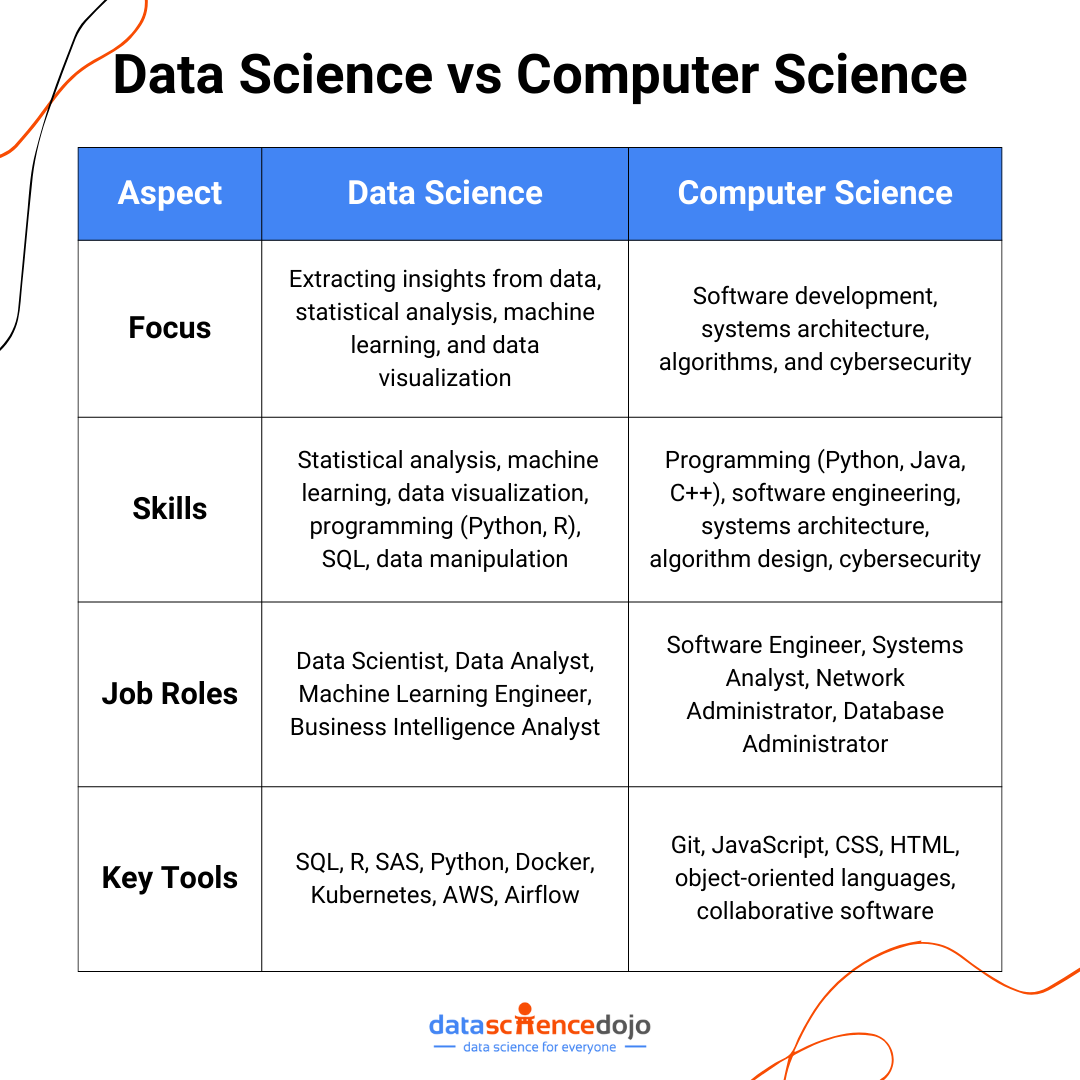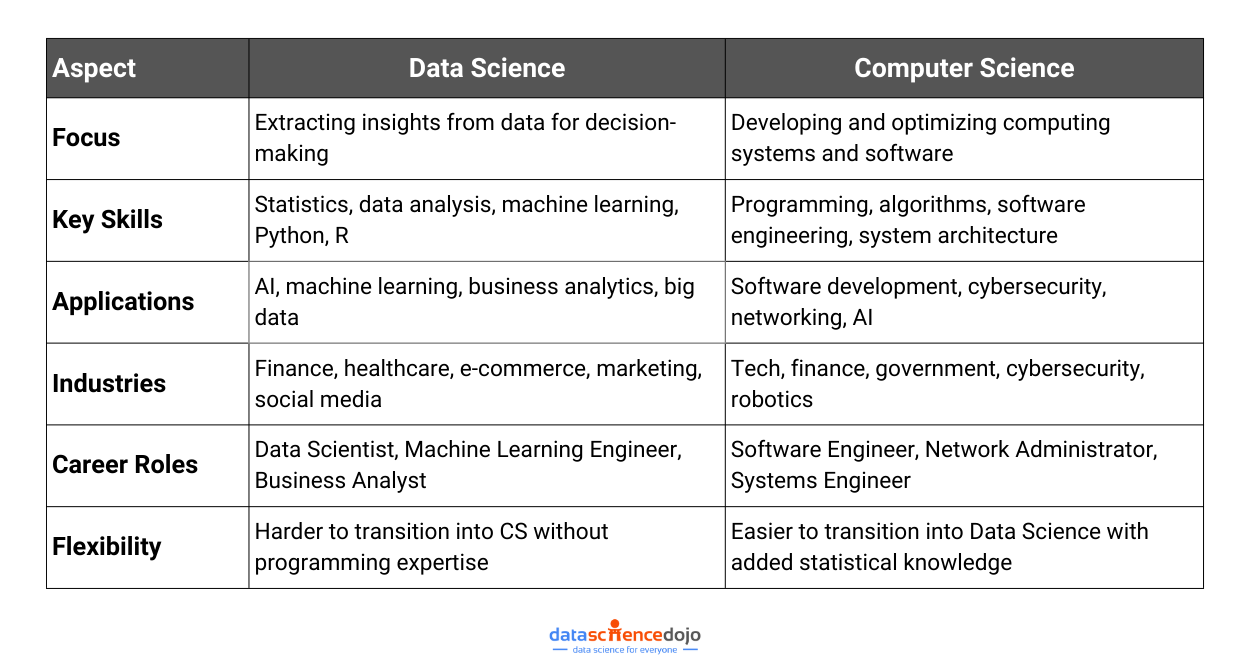Data science and computer science are two pivotal fields driving the technological advancements of today’s world. In an era where technology has entered every aspect of our lives, from communication and healthcare to finance and entertainment, understanding these domains becomes increasingly crucial.
It has, however, also led to the increasing debate of data science vs computer science. While data science leverages vast datasets to extract actionable insights, computer science forms the backbone of software development, cybersecurity, and artificial intelligence.
This blog aims to answer the data science vs computer science confusion, providing insights to help readers decide which field to pursue. Understanding these distinctions will enable aspiring professionals to make informed decisions and align their educational and career pathways with their passions and strengths.
What is Computer Science?
Computer science is a broad and dynamic field that involves the study of computers and computational systems. It encompasses both theoretical and practical topics, including data structures, algorithms, hardware, and software.
The scope of computer science extends to various subdomains and applications, such as machine learning, software engineering, and systems engineering. This comprehensive approach ensures that professionals in the field can design, develop, and optimize computing systems and applications.
Key Areas of Study
Key areas of study within computer science include:
- Algorithms: Procedures or formulas for solving problems.
- Data Structures: Ways to organize, manage, and store data efficiently.
- Software Engineering: The design and development of software applications.
- Systems Engineering: The integration of various hardware and software systems to work cohesively.
The history of computer science dates back nearly 200 years, with pioneers like Ada Lovelace, who wrote the first computer algorithm in the 1840s. This laid the foundation for modern computer science, which has evolved significantly over the centuries to become a cornerstone of today’s technology-driven world.
Computer science is crucial for the development of transformative technologies. Life-saving diagnostic tools in healthcare, online learning platforms in education, and remote work tools in business are all built on the principles of computer science.
The field’s contributions are indispensable in making modern life more efficient, safe, and convenient.
Here’s a list of 5 no-code AI tools for software developers
What is Data Science?
Data science is an interdisciplinary field that combines statistics, business acumen, and computer science to extract valuable insights from data and inform decision-making processes. It focuses on analyzing large and complex datasets to uncover patterns, make predictions, and drive strategic decisions in various industries.
Data science involves the use of scientific methods, processes, algorithms, and systems to analyze and interpret data. It integrates aspects from multiple disciplines, including:
- Statistics: For data analysis and interpretation.
- Business Acumen: To translate data insights into actionable business strategies.
- Computer Science: To manage and manipulate large datasets using programming and advanced computational techniques.
The core objective of data science is to extract actionable insights from data to support data-driven decision-making in organizations.
The field of data science emerged in the early 2000s, driven by the exponential increase in data generation and advancements in data storage technologies. This period marked the beginning of big data, where vast amounts of data became available for analysis, leading to the development of new techniques and tools to handle and interpret this data effectively.
Data science plays a crucial role in numerous applications across different sectors:
- Business Forecasting: Helps businesses predict market trends and consumer behavior.
- Artificial Intelligence (AI) and Machine Learning: Develop models that can learn from data and make autonomous decisions.
- Big Data Analysis: Processes and analyzes large datasets to extract meaningful insights.
- Healthcare: Improves patient outcomes through predictive analytics and personalized medicine.
- Finance: Enhances risk management and fraud detection.
These applications highlight the transformative impact of data science on improving efficiency, accuracy, and innovation in various fields.
Data Science vs Computer Science: Diving Deep Into the Debate
While we understand the basics within the field of data science and computer science, let’s explore the basic differences between the two.
1. Focus and Objectives
Computer science is centered around creating new technologies and solving problems related to computing systems. This includes the development and optimization of hardware and software, as well as the advancement of computational methods and algorithms.
The main aim is to innovate and design efficient computing systems and applications that can handle complex tasks and improve user experiences.
On the other hand, data science is primarily concerned with extracting meaningful insights from data. It involves analyzing large datasets to discover patterns, trends, and correlations that can inform decision-making processes.
The goal is to use data-driven insights to guide strategic decisions, improve operational efficiency, and predict future trends in various industries.
2. Skill Sets Required
Each domain comes with a unique skill set that a person must acquire to excel in the field. The common skills required within each are listed as follows:
Computer Science
- Programming Skills: Proficiency in various programming languages such as Python, Java, and C++ is essential.
- Problem-Solving Abilities: Strong analytical and logical thinking skills to tackle complex computational problems.
- Algorithms and Data Structures: Deep understanding of algorithms and data structures to develop efficient and effective software solutions.
Learn computer vision using Python in the cloud
Data Science
- Statistical Knowledge: Expertise in statistics to analyze and interpret data accurately.
- Data Manipulation Proficiency: Ability to manipulate and preprocess data using tools like SQL, Python, or R.
- Machine Learning Techniques: Knowledge of machine learning algorithms and techniques to build predictive models and analyze data patterns.
3. Applications and Industries
Computer science takes the lead in the world of software and computer systems, impacting fields like technology, finance, healthcare, and government. Its primary applications include software development, cybersecurity, network management, AI, and more.
A person from the field of computer science works to build and maintain the infrastructure that supports various technologies and applications. On the other hand, data science focuses on data processing and analysis to derive actionable insights.
Read more about the top 7 software development use cases of Generative AI
A data scientist applies the knowledge of data science in business analytics, ML, big data analytics, and predictive modeling. The focus on data-driven results makes data science a common tool in the fields of finance, healthcare, E-commerce, social media, marketing, and other sectors that rely on data for their business strategies.
These distinctions highlight the unique roles that data science and computer science play in the tech industry and beyond, reflecting their different focuses, required skills, and applications.
4. Education and Career Paths
From the aspect of academia and professional career roles, the educational paths and opportunities for each field are defined in the table below.
| Parameters | Computer Science | Data Science |
|---|---|---|
| Educational Paths | Bachelor’s, master’s, and Ph.D. programs focusing on software engineering, algorithms, and systems. | Bachelor’s, master’s, and Ph.D. programs focusing on statistics, machine learning, and big data. |
| Career Opportunities | Software engineer, systems analyst, network administrator, database administrator. | Data scientist, data analyst, machine learning engineer, and business intelligence analyst. |
Here’s a list of leading computer science roles in the industry
5. Job Market Outlook
Now that we understand the basic aspects of the data science vs computer science debate, let’s look at the job market for each domain. While we know that increased reliance on data and the use integration of AI and ML into our work routines significantly enhance the importance of data scientists and computer scientists, let’s look at the statistics.
As per the U.S. Bureau of Labor Statistics, the demand for data scientists is expected to grow by 36% from 2023 to 2033, highlighting it as a faster projection than average for all occupations. Moreover, roles for computer science jobs are expected to grow by 17% in the same time frame.
Hence, each domain is expected to grow over the coming years. If you are still confused between the two fields, let’s dig deeper into some other factors that you can consider when choosing a career path.
Making an Informed Decision
In the realm of the data science vs computer science debate, there are some additional factors you can consider to make an informed decision. These factors can be summed up as follows:
Natural Strengths and Interests
It is about understanding your interests. If you enjoy creating software, systems, or digital products, computer science may be a better fit. On the other hand, if you are passionate about analyzing data to drive decision-making, data science might be more suitable.
Another way to analyze this is to understand your comfort with Mathematics. While data science often requires a stronger comfort level with mathematics, especially statistics, linear algebra, and calculus, computer science also involves math but focuses more on algorithms and data structures.
Flexibility and Career Path
If your skill set and interests make both fields still a possible option to consider, the next step is to consider the flexibility offered by each. It is relatively easier to transition from computer science to data science compared to the other way around because of the overlap in programming and analytical skills.
With some additional knowledge in statistics and machine learning, you can opt for a smooth transition to data science. Hence, this gives you a space to start off with computer science and experiment in the field. If you do not get comfortable, you can always transition to data science with some focused learning of specific aspects of computer science.
To Sum it Up
In conclusion, it is safe to say that both fields offer lucrative career paths with high earning potential and robust job security. While data science is growing in demand across diverse industries such as finance, healthcare, and technology, computer science is also highly needed for technological innovation and cybersecurity.
Looking ahead, both fields promise sustained growth and innovation. As technology evolves, particularly in areas like AI, computing, and ML, the demand for both domains is bound to increase. Meanwhile, the choice between the two must align with your goals, career aspirations, and interests.
To join a community focused on data science, AI, computer science, and much more, head over to our Discord channel right now!






